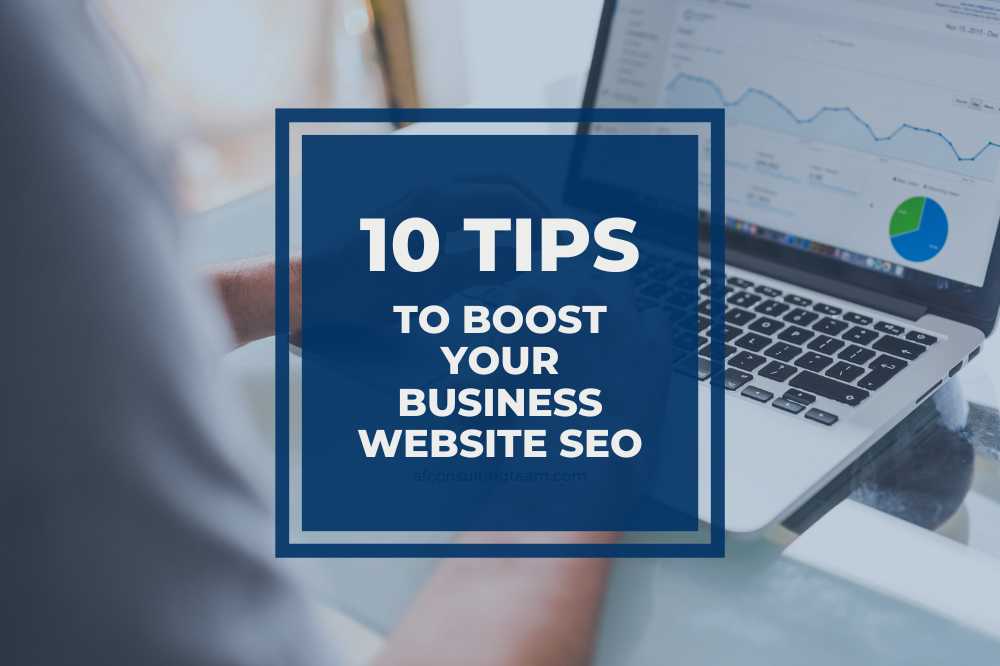Top 10 Tips to Boost Your Business Website SEO
We hear about it all the time—your website SEO is sooooo important. But what does that mean? In the digital age, having a strong online presence is crucial for the success of any business. With millions of websites (just like yours) competing for attention, ensuring that your website stands out to both users and search engines is paramount. Search Engine Optimization (SEO) plays a vital role in driving organic traffic to your website and increasing your visibility on search engine results pages (SERPs). Here are some top tips for business owners to boost their website SEO and enhance their online presence:
- Keyword Research and Optimization: Conduct thorough keyword research to identify the terms and phrases your target audience is searching for. Use tools like Google Keyword Planner or SEMrush to discover relevant keywords with high search volumes and low competition. Incorporate these keywords strategically into your website’s content, including page titles, headings, meta descriptions, and body text, to improve your chances of ranking higher in search results.
- High-Quality Content Creation: Create compelling, informative, and valuable content that resonates with your audience. Content quality is a significant factor in SEO rankings, so focus on producing original, well-written content that addresses the needs and interests of your target market. Regularly update your website with fresh content to keep visitors engaged and encourage search engine crawlers to index your site more frequently.
- Optimize Website Structure and Navigation: Ensure that your website is well-organized and easy to navigate for both users and search engines. Implement a clear hierarchy with logical URL structures, descriptive headings, and internal linking to facilitate seamless navigation. A user-friendly website structure not only enhances the user experience but also helps search engines understand the relevance and context of your content.
- Mobile Optimization: Let’s face it, we’re always on our phones! With the increasing use of mobile devices, optimizing your website for mobile responsiveness is essential for SEO success. Google prioritizes mobile-friendly websites in its search rankings, so make sure your site is optimized for various screen sizes and devices. Use responsive design techniques to ensure that your website adapts seamlessly to different platforms, providing a consistent and user-friendly experience across all devices.
- Page Speed Optimization: Page speed is a critical ranking factor for search engines and directly impacts user experience. Optimize your website’s loading times by minimizing file sizes, leveraging browser caching, and reducing server response times. Use tools like Google PageSpeed Insights or GTmetrix to identify performance issues and implement optimizations to improve your website’s speed and performance.
- Meta Tags and Descriptions: Craft compelling meta tags (title tags and meta descriptions) for each page of your website, incorporating relevant keywords and accurately summarizing the page content. Meta tags serve as concise previews of your web pages in search results, influencing click-through rates and SEO rankings. Write unique and enticing meta tags for each page to encourage users to click through to your website.
- Optimize Images and Multimedia: Images and multimedia elements can enhance the visual appeal of your website and engage users, but they can also impact loading times if not optimized properly. Compress images to reduce file sizes without sacrificing quality, and use descriptive filenames and alt tags to help search engines understand the content of your media files. Additionally, consider lazy loading techniques to prioritize the loading of visible content first, improving overall page speed.
- Secure Your Website with HTTPS: Website security is increasingly important for both user trust and search engine rankings. Switch to HTTPS to encrypt data transmitted between your website and its visitors, providing a secure browsing experience. Google considers HTTPS as a ranking signal, so migrating to HTTPS can potentially boost your SEO performance while also enhancing security and privacy for your users.
- Local SEO Optimization: If your business serves a specific geographic area, optimize your website for local search by claiming and optimizing your Google My Business listing, including accurate business information, such as your name, address, phone number, and operating hours. Encourage customer reviews and testimonials to build credibility and authority in local search results.
- Monitor and Analyze Performance: Regularly monitor your website’s SEO performance using tools like Google Analytics and Google Search Console. Track key metrics such as organic traffic, keyword rankings, click-through rates, and conversion rates to evaluate the effectiveness of your SEO efforts. Use this data to identify areas for improvement and refine your SEO strategy over time.
Using these top tips to boost website SEO can help business owners enhance their online visibility, attract more organic traffic, and ultimately drive business growth. By focusing on keyword research, content quality, website optimization, and performance monitoring, you can optimize your website for search engines and improve your chances of success in the competitive online landscape. Remember that SEO is an ongoing process, so continue to adapt and refine your strategies to stay ahead of the curve and maintain your competitive edge.

